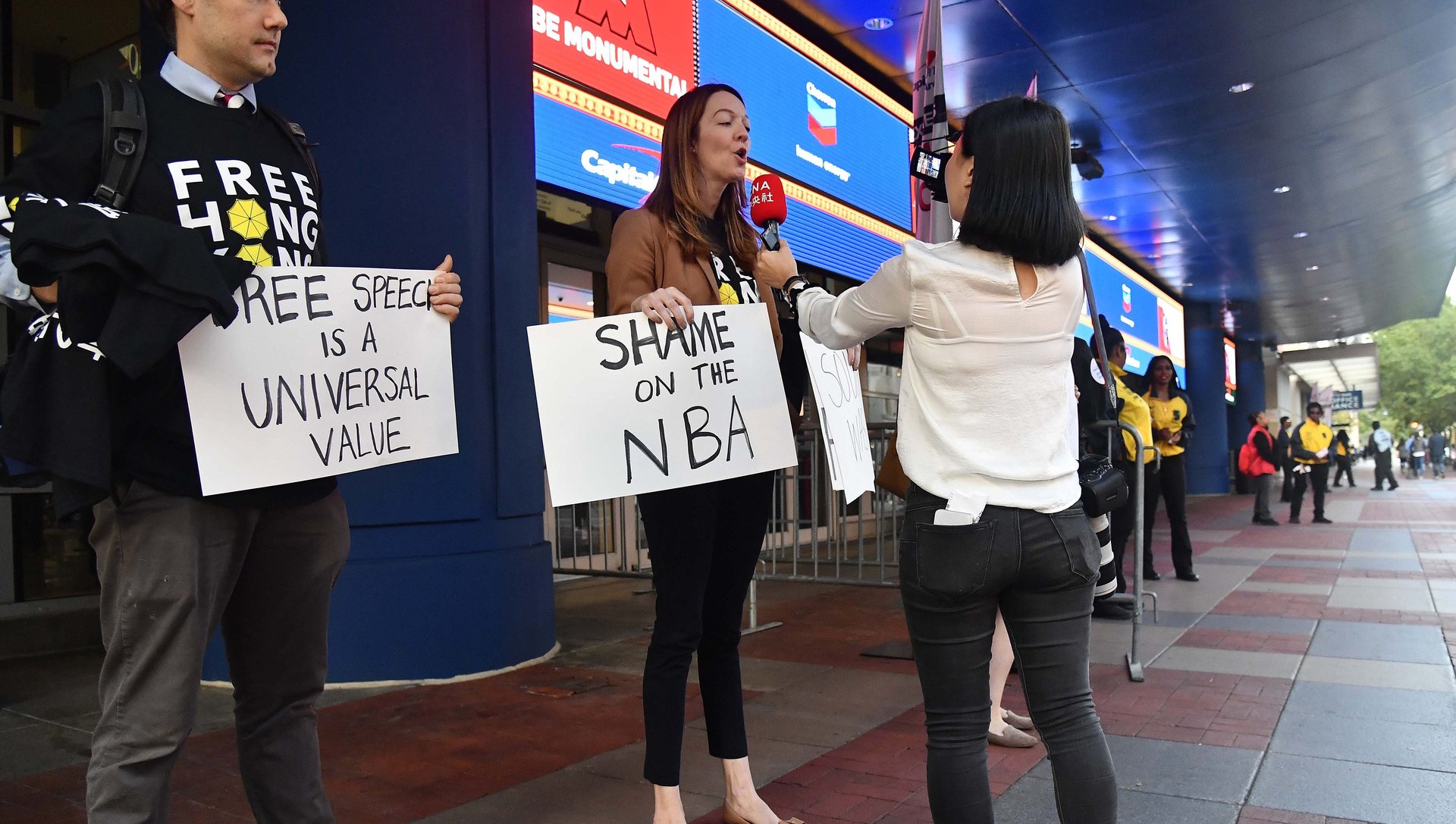The NBA may have just thrown Hong Kong’s protesters a new lifeline
The Hong Kong protests are benefiting from China’s latest effort to quash speech about them—which involved starting a full-blown spat with the NBA.


The Hong Kong protests are benefiting from China’s latest effort to quash speech about them—which involved starting a full-blown spat with the NBA.
It’s unlikely many basketball fans in the US were paying close attention to the months-long protests in Hong Kong. But the deepening fallout between the league and Beijing, stemming from a now-deleted tweet by Houston Rockets general manager Daryl Morey last week expressing support for Hong Kong’s protests, has put the issue front and center of American basketball, and even arguably America’s news cycle.
There’s a name for such unintended consequences: the “Streisand effect.”
Politicians from across the spectrum—from Ted Cruz to Alexandria Ocasio-Cortez—have warned the NBA not to compromise America’s respect for free speech and bend to China’s will. The Washington Post (paywall), the New York Times, and the Wall Street Journal (paywall) have advised the league in strongly worded editorials not to be complicit in Chinese censorship. The Daily Show‘s Trevor Noah devoted a segment to the NBA firestorm, with a pretty comprehensive list of China’s offense-taking in the last two years.
And basketball fans have added oil to the issue, as Hong Kongers might say, by taking protest messages directly to NBA games. Fans attending pre-season NBA games in the US have worn t-shirts or held up placards bearing messages of solidarity with Hong Kong, including during an exhibition game between the Washington Wizards and the Guangzhou Loong Lions. One group also carried a message referring to China’s persecuted Uyghurs in Xinjiang. Some were booted from the games—in one case, while the US anthem was playing—or had their signs confiscated.
China has been retaliating against the NBA after the league’s chairman Adam Silver failed to apologize for Morey’s actions or discipline the manager, which prompted a host of Chinese NBA partners and sponsors to sever ties with the league. While many expected Silver to capitulate in the face of Chinese pressure—as numerous other American and global corporations have done in the past—Silver on Tuesday (Oct. 8) said on a visit to Japan that he strongly supported the league’s values of “equality, respect and freedom of expression.” Since then, China’s punitive measures NBA have worsened, canceling a fan event scheduled for yesterday (Oct. 9) in Shanghai. An exhibition match between the Los Angeles Lakers and Brooklyn Nets this evening appears set to go ahead.
For many long-time observers of China, the NBA saga is a perfect storm that’s finally bringing to the forefront of American discourse the problem of China’s attempts to bully countries and companies that do not bend to its dictates. Prior to the NBA, US companies such as Coach and Nike have bowed down to China in various ways after they unwittingly “offended” Chinese sovereignty, but most of those incidents flew under the radar. The NBA, with its huge domestic following, is different—Nike removing an offending sneaker from China’s shelves does not touch the average US consumer, but the thought that China’s economic clout could force an NBA team to punish managers or players for their speech, or restrict the speech of audience members on US soil, is a different ball game.
Hong Kong’s protesters, who have long seen international support as key to their success—particularly from the US—have tried, with mixed results, to draw attention to the ways that Beijing’s authoritarian approach can have a reach far beyond China’s borders. But the NBA debacle has accomplished exactly that—granting protesters an extraordinary opportunity to galvanize support for their own cause.
And as if the perfect storm couldn’t get more perfect, a number of other US companies have also at the same time been drawn into the China-Hong Kong maelstrom. Apple today pulled an app showing real-time, crowdsourced maps of the city’s protest hotspots just a day after China’s biggest state-run paper warned that the tech giant would suffer consequences for its “unwise and reckless” decision of approving the “poisonous” app. US game maker Blizzard—partly owned by China’s Tencent—earlier this week suspended a Hong Kong Hearthstone player after he shouted a protest slogan during a post-game interview, prompting calls among players to boycott the company. ESPN reportedly sent out an internal memo barring mention of Chinese politics on its shows. And South Park drew attention to the topic of Chinese censorship of American companies in an episode last week, with the show now censored in China.
These rapidly mounting instances do seem to be succeeding in bolstering bipartisan opposition in the US toward China’s censorship attempts, with protesters looking forward to the passage of the Hong Kong Human Rights and Democracy Act, which would freezing the assets of and barring entry to officials found to be complicit in suppressing freedoms in Hong Kong. But international support can be fickle and unpredictable, particularly with president Donald Trump in the White House—NBA fanatics and gamers may well turn out to be more steadfast, and useful, allies.
Writing in a column (link in Chinese), Allan Au, a current affairs commentator who teaches at the Chinese University of Hong Kong, said that it’s understandably “difficult” to get outsiders to care too much about the affairs of other countries, but now through the NBA incident Americans of all stripes see how “a simple tweet can draw the ire of China.” The development also gives Hong Kong’s protesters—stuck in a bottleneck of escalating violence—time for a breather while others wade into the fray on their behalf.
“Hong Kong’s fighters can take a rest, and let the bullets fly,” he wrote.